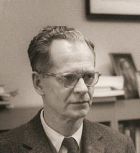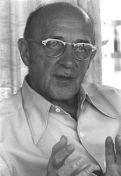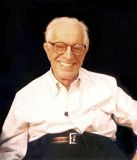The other day, Allen Bergin, a very influential LDS psychologist guest lectured in the History of Psychology graduate course I am taking at BYU. Bergin, probably more than any other individual, can be credited for opening up psychology to spiritual and religious phenomena, especially in psychotherapy.
There are a few very interesting “nuggets” of information, especially concerning Bergin’s encounters with some very famous psychologists, that I would like to report.
First, let me tell you a little bit about Bergin’s background, based on some things he said in the class. You can read more in this Ensign article. Bergin began his studies at MIT (in mathematics or engineering, I think), but he grew to be dissatisfied with the lack of humanities in his technical education. So he transferred to Reed College in Oregon where he enjoyed a liberal arts education, majoring in physics. While at Reed, Allen met and started dating Marian Shafer, a lifelong Mormon from Ogden, Utah. As a result, Bergin began to investigate the Church of Jesus Christ of Latter-day Saints — a long process that resulted in his joining the Church (after he began being a student at BYU, where he and Marian both transferred) and marrying Marian. Robert K. Thomas, a BYU professor and Reed College alumnus, played a key role in Bergin’s conversion.
At BYU, Bergin switched his study emphasis to psychology, earning Bachelor’s and Master’s degrees. He then was privileged to enter a Ph.D. program in clinical psychology at Stanford University, in which he worked with Albert Bandura, among others. Bandura, famous for his social-cognitive theory, was a leader of the cognitive-behaviorist movement in psychology. After Stanford, Bergin completed post-doctoral work at the University of Wisconsin with Carl Rogers, one of the most famous psychologists of all time. Rogers, along with Abraham Maslow, is seen as the founder of humanistic psychology.
Bergin was hired as a professor at Columbia University, where he co-authored (with Sol Garfield) the Handbook of Psychotherapy and Behavior Change, a landmark text that is widely cited by clinicians and researchers today. In 1972, Bergin came to BYU where he retired sometime in the 90s (not sure the exact year). In 1980, Bergin wrote an extremely influential article in which he advocated for the inclusion of spirituality and religion in psychotherapy. Since then, there has been such a tremendous turn, due in large part to Bergin, towards the spiritual in therapy that it is difficult for the upcoming generation to imagine that it was once seen as completely off-limits. In his later years, Bergin co-authored and co-edited with BYU’s P. Scott Richards several books regarding spirituality and psychotherapy, all of which are seen as significant works in the area. (You can’t talk about spirituality in psychotherapy without citing Richards and Bergin.)
OK, let me tell you about some interesting experiences Bergin had — all of which he spoke about with remarkable tenderness and fondness for the famous psychologists involved.
Skinner
Bergin had an interesting encounter with B.F. Skinner, an enormously famous and controversial psychologist who is the founder of modern behaviorism. When Bergin was at Columbia, Skinner gave a guest lecture there and then had lunch with several faculty members. Skinner, an outspoken atheist, casually talked about the cover newspaper story that day, which showed a picture of a Star of David carving, purported to be a thousand years old (or something like that) on a tree in South America. He then something like, “It would probably upset a whole lot of people if Joseph Smith ended up being right.”
Bergin commented that he was surprised that Skinner even knew of this connection, but in talking with him about it, he learned that Skinner grew up in the Harmony, Pennsylvania area and so he was well acquainted with the tradition. (I wonder also if Skinner had some familiarity because of S.S. Stevens, a Mormon from rural Utah who was a classmate of Skinner’s at Harvard; both worked under E.G. Boring. Stevens became a very influential psychologist in his own right, playing a major role for removing the subjective from psychology through operational definitions — a very poor move, in my opinion. Interestingly, nearly everyone who knew Stevens well saw him as an arrogant egoist with awful people skills; he left the Church in his early years at Harvard. Also, Harold Miller, a current professor of psychology at BYU, knew Skinner when he was a student at Harvard, though I imagine this might have been after Bergin’s encounter. But I digress.) Bergin also mentioned that Skinner spoke with great fondness of his daughter Deborah, then an adult, for whom he had been (wrongly) vilified as a monster for using his “Skinner box” to reinforce her behavior when she was an infant.
Rogers
When Bergin was working with Rogers, he would occasionally bring up the subject of religion in psychology, which Rogers, if I remember correctly, was somewhat sympathetic to but was not very interested in pursuing. This climate discouraged Bergin from pursuing much by way of his interests in religious and spiritual issues while at Michigan.
Years later, around 1980, when Bergin was at BYU, he gave a presentation where he presented the ideas that would soon be published in his landmark article on spiritual and religious psychotherapy interventions. Carl Rogers was part of the same panel of presenters, and afterwards gave Bergin a giant bear hug, telling him he is happy that he is finally speaking from his gut. Rogers’ reaction to Bergin is characteristic of his humanistic theory, for which Rogers argued that individuals should have unconditional positive regard to others. A climate of unconditional positive regard allows for congruency between one’s real self and one’s ideal self. Bergin jokingly commented in class that, ironically, Rogers was an important contributor to his previous incongruency! Bergin also talked about how Rogers became more interested in spirituality in his later years.
Ellis
Albert Ellis, who recently passed away, is famous for his rational emotive behavior therapy (REBT). He was an outspoken atheist and promoter of sexual liberation (famous for his controversial prescriptions of promiscuity without guilt.) After Bergin’s famous 1980 article was published, Ellis published a rebuttal in which he argued for a refined view of his own atheist stance and asserted that he is not totally opposed to religion, simply dogmatism. Ellis argued that religion, on the whole, is unhealthy and people would be better off to stop believing in such superstitions, especially the belief of any kind of certainty about God. Bergin agreed with several of Ellis’ points in the rebuttal, but argued that many secular atheist-agnostic humanistic views that are common in psychology were just as guilty as dogmatic certainty, if not more so in some cases. This exchange between Bergin and Ellis is one of the most famous exchanges in psychology in the past 30 years.
Sometime after this time, Bergin and Ellis were both part of the same panel of presenters at a psychology meeting. Bergin presented empirical research that showed, using a large sample of BYU students compared with other (non-religious) students, that religion can have positive effects on mental health. Ellis quipped with something like, “I know about those BYU students — they’ll tell you whatever you want to hear.” Bergin responded that the lie scale detected by the MMPI (one of the surveys used in the study) was not significantly different among the groups. Ellis responded that he didn’t believe in the MMPI… (neither do I, judging from my experience administering it at the Utah State Prison).
Interestingly, Bergin noted, Ellis’ animosity towards religion toned down considerably in his later years. Ellis acknowledged (citing his Wikipedia article) “that belief in a loving God can be psychologically healthy.” He even co-authored a book about how REBT can be used from a religious perspective: Counseling and Psychotherapy With Religious Persons: A Rational Emotive Behavior Therapy Approach. The book’s first author, Steven Lars Nielsen, is a Latter-day Saint psychologist at BYU. Bergin credited Nielsen’s relationship with Ellis as an important factor in Ellis’ greater openness to religion.
Well, I hope you found this to be an interesting exploration of some very famous names in psychology.

Continue reading at the original source →






